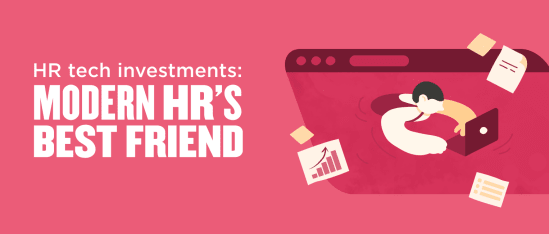Businesses today don’t have it easy. They’re hybrid, remote, and multi-site. Team members are spread around the world, hired under myriad contract types, and have a wide variety of working styles, skill sets, and needs. Companies need to juggle multi-national policies, budgets, and laws and regulations–all while somehow keeping their people happy, engaged, and productive. To say it’s complex is an understatement.
One thing is clear: Thriving modern businesses put people at the centre of their business strategy. HR has taken the lead in these initiatives, ramping up HR programs to meet organisations’ growing demands and complexities. And like other business engines, HR has gone digital, relying on top-tier HR tech to ensure optimal efficiency as they evolve and scale.
Research by HiBob and CIPD shows that companies are all-in when it comes to getting HR the tech they need to get the job done—and they’re prioritising all-in-one solutions over cost.
Modern HR tech is built to support complex HR programs
According to the research, over 52 percent of today’s businesses have prioritised investing in an HRIS in the next 12 months to help “store, update, and track employee information.” Over 36 percent have prioritised investing in recruitment software, and over 35 percent have prioritised investing in people analytics and reporting tools.
This is because today’s HR-led programs span everything from workforce planning, recruitment, and onboarding to performance management, enhancing employee engagement and the employee experience to time and attendance and building a remarkable company culture—across globally dispersed sites and time zones. It’s also up to HR to identify the top talent your business relies on—and to keep those professionals with you.
Without robust HR tech to support each of these programs, so much people data is at risk of falling between the cracks.
HR tech is key to keeping today’s global businesses running efficiently, avoiding human error, staying compliant, and saving companies time. It’s essential to maintaining and boosting businesses’ bottom line.
And now, as the world braces for a recession and hunkers down against rising inflation, it’s more critical than ever to rein in spending and keep the business lean. To help with the heavy lifting, companies are prioritising their investments in HR software.
Global companies like Novatti rely on HR tech to stay compliant and collect the data they need to demonstrate it to multiple stakeholders. And companies like VaynerMedia rely on HR tech to streamline the employee lifecycle, boost the employee experience, and provide them with the accurate people data they need to make strategic decisions fast.
Modern HR tech simplifies global and local HR processes
Whether your business is local or international, HR tech is essential to running any modern business. After all, it’s here to help lighten the load as your organisation grows with automated processes designed to adapt quickly to change, whether it’s global hypergrowth or an economic slowdown.
The bottom line is that HR teams today need flexible solutions to help manage progressively complicated people processes in a fast-evolving world. On top of that, the more multi-national your business is, the more HR tech you need to support your programs.
The proof is in the data: HR leaders’ top five priorities over the next 12 months to three years are investing in an HRIS, L&D, people analytics, recruitment, and performance management tools. These are just the top five.
There are various HR tools out there to help with the heavy lifting for each of these challenges, but dealing with so many point solutions can get cluttered, frustrating, and expensive—especially when they don’t integrate. This can put you back at square one, manually pulling data from scores of point solutions and inputting it into spreadsheets.
On the other hand, all-in-one HR platforms are a more cost-effective and time-saving alternative. They’re definitely on businesses’ radar, with 53 percent of HR leaders surveyed stating that they’re looking for an HR tech solution that includes all the capabilities they’ll need now and in the future.
The advantages of all-in-one HR platforms
The best HR platforms simplify all your complex processes, give you a single source of truth for all your people data and offer increased flexibility. How?
There may be a variety of HR platform options. But the best one will offer a full suite of features and allow you to easily integrate with the point solutions you need to keep in your tech stack, like local payroll, PTO, and compliance tools for globally dispersed sites.
Recommended For Further Reading
Value beyond the tech stack
The real value of all-in-one HR platforms is their ability to drive cross-team and multi-site visibility and collaboration.
Many HR platforms include compensation benchmarking, pulse surveys, performance tools, people operations, and workforce planning as fully built-in features. Anyone with the right permissions, from HR team members to managers and the C-suite, can view, share, and export the data. But, they also go far for managers and individual contributors.
Features like goal setting, performance reviews, and one-on-one meetings are essential for today’s globally distributed teams. They promote organisational transparency and help every team member—no matter where they are in the world—feel included and empowered at the company, which boosts employee engagement, productivity, and overall satisfaction.
HR platforms are the cornerstone of the modern organisation’s tech stack
Comprehensive HR platforms are more in tune with what today’s companies need. They integrate with complex tech stacks that include automation services, ATS, LMS, payroll software, directory services, ERP and productivity solutions, and more.
It’s why today’s HR organisations favor single-source-of-truth platforms and tools: They simplify and streamline people processes and make it easy for global teams to collaborate with managers at any site easily, compare data between teams, and check it against benchmarks at the global and local levels.
Read the joint CIPD-HiBob report on HR software investment here.


